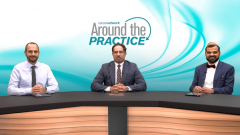
Opinion|Videos|January 31, 2025
Comanaging Cases of RR/MM in Patients Receiving CAR T
Panelists discuss how successful comanagement of CAR T-cell therapy cases requires close coordination between academic centers and community practices, with structured protocols for monitoring, communication, and patient handoffs, while addressing challenges in referral timing, resource allocation, and long-term follow-up care.
Advertisement
Episodes in this series

Video content above is prompted by the following:
- Describe your institution’s approach to the comanagement and comonitoring of patients receiving CAR T-cell therapy, particularly in the transition back to the community setting.
- Dr Abdallah to ask Dr Kort: Can you share any specific strategies or tools your institution utilizes to facilitate seamless transitions of care between the academic center and community practices for patients receiving CAR T-cell therapy?
- Dr Abdallah to ask Dr Mahmoudjafari: What are the most common challenges you have encountered in the CAR T referral process, and how have you addressed them at your institution?
- Dr Abdallah to ask Dr Mushtaq: What advice would you provide to community physicians regarding the appropriate timing and preparation for referring patients for CAR T therapy?
- Dr Abdallah to ask Dr Kort: Can you share any examples of successful collaborations between your academic center and community practices in the context of CAR T therapy for multiple myeloma?
- Dr Abdallah to ask Dr Mahmoudjafari: What are the most important lessons your institution has learned in the integration of CAR T therapy into the multiple myeloma treatment landscape?
Newsletter
Stay up to date on recent advances in the multidisciplinary approach to cancer.
Advertisement
Latest CME
Advertisement
Advertisement
Trending on CancerNetwork
1
Modifiable Risk Factors Suggest Potential for Improving Cancer Prevention
2
2026 Tandem Meetings: What’s the Latest Research in Multiple Myeloma?
3
Dato-DXd Receives Priority Review in Unresectable/Metastatic TNBC
4
Barriers to CAR T-Cell Referral and Center Access in Multiple Myeloma
5



































